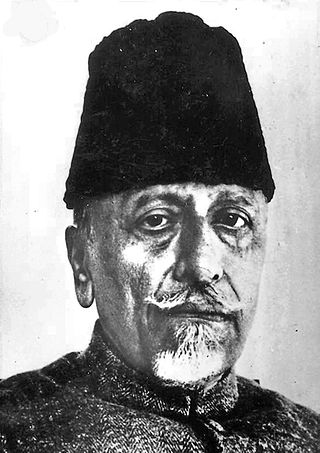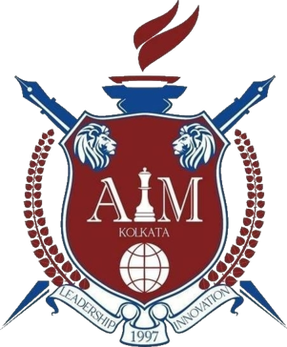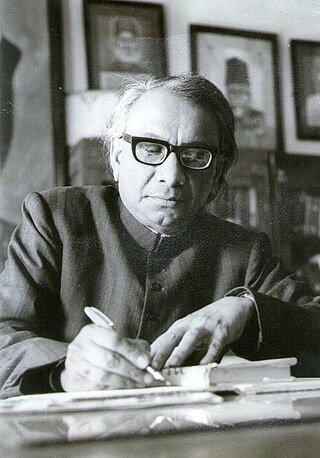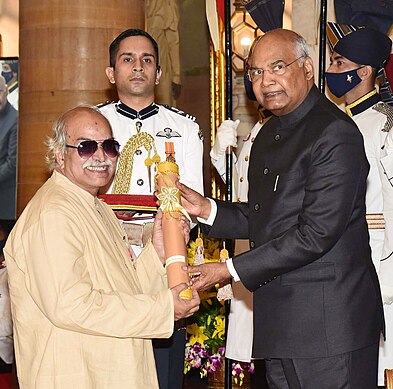
Abul Kalam Ghulam Muhiyuddin Ahmed bin Khairuddin Al-Hussaini Azad ; 11 November 1888 – 22 February 1958) was an Indian independence activist, writer and a senior leader of the Indian National Congress. Following India's independence, he became the First Minister of Education in the Indian government. He is commonly remembered as Maulana Azad; the word Maulana is an honorific meaning 'Our Master' and he had adopted Azad (Free) as his pen name. His contribution to establishing the education foundation in India is recognised by celebrating his birthday as National Education Day across India.

Maulana Azad National Institute of Technology Bhopal is a public technical university located in Bhopal, Madhya Pradesh, India. It is part of a group of publicly funded institutions in India known as National Institutes of Technology. It is named after the Independent India's first Minister of Education (India), scholar and independence activist Abul Kalam Azad who is commonly remembered as Maulana Azad.
Education in West Bengal is provided by both the public sector as well as the private sector. Health Sciences, University of North Bengal and University of Calcutta.
The Indian Institutes of Technology (IITs) are the premier autonomous public technical and research universities located across India, founded under the leadership of Pandit Jawaharlal Nehru.

Maulana Azad Medical College (MAMC) is a medical college in New Delhi, India affiliated to University of Delhi and run by the Government of Delhi. It is named after Indian freedom fighter and first education minister of independent India Maulana Abul Kalam Azad. It was established in 1959 at Bahadur Shah Zafar Marg near Delhi Gate.

The Army Institute of Management, formerly the National Institute of Management Calcutta (NIMC), is a graduate business school located in Kolkata, India. It was established on 28 July 1997 by the Indian Army under the aegis of Army Welfare Education Society (AWES), New Delhi, to conduct a management programme (MBA) for the wards of Army personnel with an opportunity for general candidates as well. The institute will be inviting the new batch for their BBA programme in July 2022.

Super 30 is an Indian educational programme started in Patna, India under the banner of Ramanujan School of Mathematics. It was founded by Anand Kumar, a mathematics teacher. The programme selects 30 talented candidates each year from economically underprivileged sections of Indian society and trains them for the JEE. The programme is portrayed in the 2019 film, Super 30, starring Hrithik Roshan as Anand Kumar, and his school, have been the subject of several smear campaigns, some of which have been carried in Indian media sources.

The Maulana Abul Kalam Azad Institute of Asian Studies is an autonomous research institute based in Kolkata. It is funded by the Ministry of Culture of the Government of India. It was founded on 4 January 1993. The foundation stone of the institute was laid where the new building now stands on 12 March 1993. It is devoted to the study of the life and works of Maulana Abul Kalam Azad, the eminent nationalist leader and India's first education minister, after whom it is named, and to the furtherance of Area Studies, with special reference to South Asia, Central Asia and West Asia, especially dealing with social, cultural, economic, political and administrative developments in Asia from the nineteenth century to the present. M.Phil.- and Ph.D.-level students of the University of Calcutta, Jadavpur University and Jawaharlal Nehru University, New Delhi are also associated with it.

Indian Institute of Technology Patna is one of the 23 IITs, located at Bihta near Patna, Bihar (India). It is recognized as an Institute of National Importance by the Government of India. It is one of the second generation IITs established by an Act of the Indian Parliament on 6 August 2008.

Vinod K. Singh is a Rahula and Namita Gautam Chair Professor of Chemistry at IIT Kanpur. He is also the Director's Chair Professor at IISER Bhopal & adjunct professor at NIPER Hyderabad. He is currently the President, Chemical Research Society of India and the Chairman, Governing Council of IACS Kolkata.

Abdul Qavi Desnavi was an Indian Urdu language writer, critic, bibliographer and linguist. He wrote many books on Urdu literature. His works included about Maulana Abul Kalam Azad, Mirza Ghalib and Allama Muhammad Iqbal. He was awarded with several awards for his literary works.
Vashishtha Narayan Singh was an Indian mathematician and academic. He taught mathematics at various institutes in India between the 1960s and the 1970s. He is popular on social media for supposedly having challenged Einstein's Theory of Relativity but there are no credible sources that prove so. In the early 1970s, Singh was diagnosed with schizophrenia due to which he was repeatedly in and out of psychiatric hospitals and only returned to academia in 2014. He was posthumously awarded the Padma Shri, the fourth highest civilian award of India for his contributions, in 2020.
Syeda Saiyidain Hameed is an Indian social and women's rights activist, educationist, writer and a former member of the Planning Commission of India. She chaired the Steering Committee of the Commission on Health which reviewed the National Health Policy of 2002, till the dissolution of the body in 2015, to be replaced by NITI Aayog.
Prem Chandra Dhanda was an Indian physician and a medical academic. He was the principal of the Maulana Azad Medical College, New Delhi and the director of G. B. Pant Hospital, New Delhi. The Government of India awarded him the third highest civilian honour of the Padma Bhushan, in 1962, for his contributions to medicine.

Kasturi Lal Chopra was an Indian materials physicist and a former director of the Indian Institute of Technology, Kharagpur. He was the founder of the Thin Film Laboratory at Indian Institute of Technology, Delhi and the Microscience Laboratory at IIT, Kharagpur and held several US and Indian patents for his research findings. Author of a number of books on thin film technology, he was a recipient of Shanti Swarup Bhatnagar Prize, the highest Indian award in the science and technology categories. The Government of India awarded him the fourth highest civilian honour of the Padma Shri, in 2008, for his contributions to science and engineering.
Padma Shri Piyong Temjen Jamir was a noted Hindi scholar and littérateur from Longsa village under Mokokchung district in Nagaland state of India. He was conferred the Padma Sri honour by the President of India, Ram Nath Kovind, in 2018 for the promotion of Hindi language and social work.
Vishwa Nath Datta was a distinguished Indian writer, historian and professor emeritus at Kurukshetra University.
Jnanendra Chandra Majumdar was an anti-colonial Bengali politician, and a representative of East Pakistan to the Constituent Assembly of Pakistan.
Abul Kalam Qasmi Shamsi is an Indian Islamic scholar, author, essayist and an Urdu translator of the Qur'an. He has been the principal of Madrasa Islamia Shamsul Huda, Patna, for about thirteen years. Some of his works included Tazkira Ulama e Bihār, Tahrīk e Aazādi Mein Ulama e Kirām Ka Hissa, Bihār Ki Urdu Shā'irī Mein Ulama Ka Hissa and Tashīl-ul-Qur'an.











